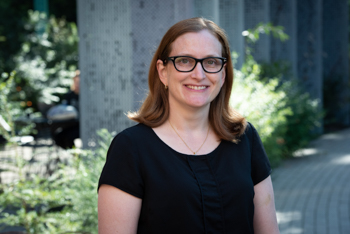Jennifer Flegg

Jennifer Flegg is an Associate Professor at the School of Mathematics and Statistics. Jen uses mathematics and statistics to help answer questions in biology and medicine. In one of her projects, Jen uses mathematics to try and help eliminate malaria. This involves understanding how malaria is spreading in space and time, as well as resistance to the drugs that are used to treat malaria.
Jen's website: https://blogs.unimelb.edu.au/jennifer-flegg/
If you could share a meal with any mathematician/statistician (alive or not), who would it be and why?
I would love to have a meal with Alan Turing. Alan Turing’s very well known for his work on the Enigma Machine but slightly less well known is that he did a lot of work in the early stuff of mathematical biology, looking at Turing Patterns which are named after Alan Turing himself. A lot of the early mathematical biology work has stemmed from Alan Turing. I would love to have a chat to him. I think also just his personal experiences would be fascinating to have a conversation with him, quite sad I guess as well.
What is the best thing about working in maths and stats?
The best thing about working in maths and stats, for me - because I’m in applied maths and mathematical biology, is that I get to collaborate with people outside of mathematics. I get to work with clinicians and people that collect data in the field – you know, doctors, nurses, those sorts of people. It’s quite a collaborative experience which means I don’t feel like I’m working by myself, it’s not like a solo sport, it’s actually a team effort to get something done.
What was your relationship with maths and stats like in school?
If you don’t like maths at high school it doesn’t mean you won’t like maths after high school. I often find that people will say ‘I didn’t like maths at high school’ but I actually think they’d be quite interested in maths at university. It’s just pushing through that and staying with it. Getting those foundations, it’s a hard slog to get that done, but once you get that done, you get to see all the really cool things you can do with maths.
What do you think is an important skill for a mathematician/statistician?
I think it’s really important that we break down that stereotype of what it is to be a mathematician - as someone who can’t communicate, and let people realise that actually mathematicians can also be quite good at communicating.
For me, those skills have been developed through working with people outside of maths and stats because when you talk to someone who doesn’t know much about equations, ... you have to push outside of what you're most comfortable with into different ways of communicating.